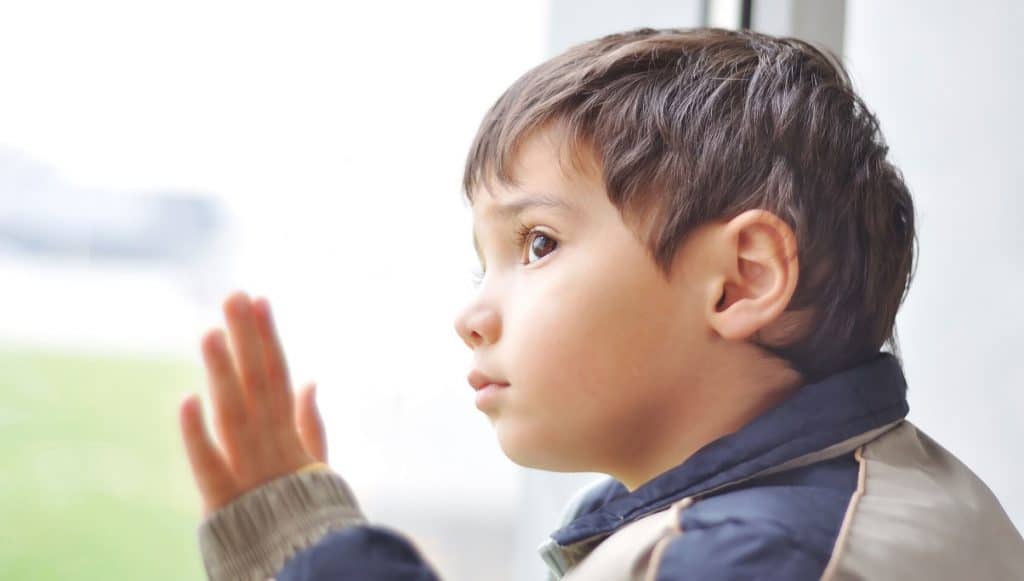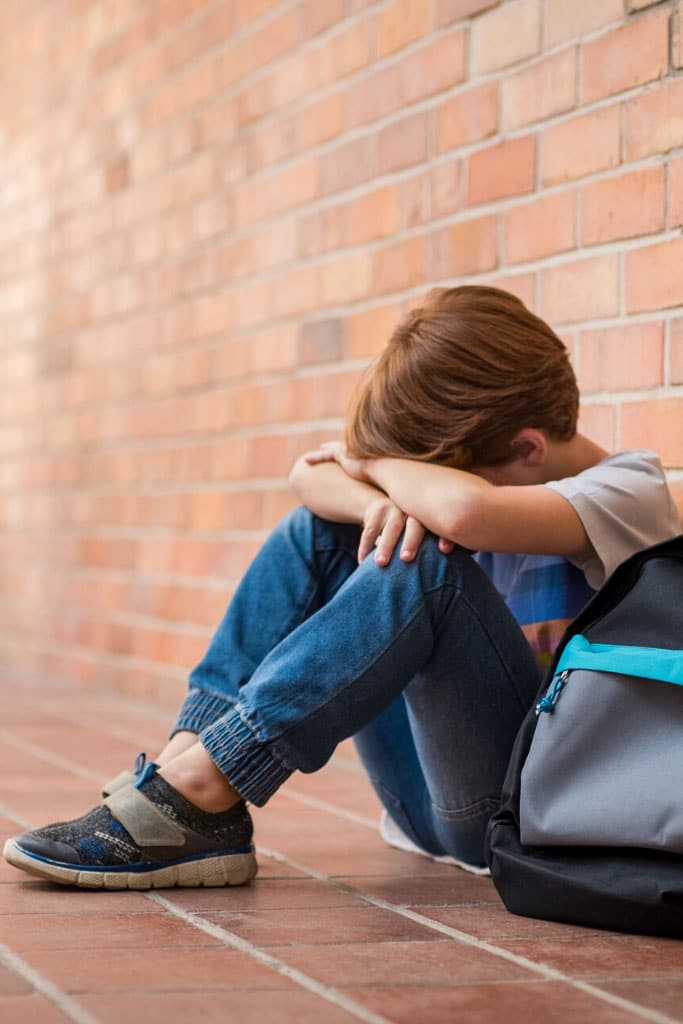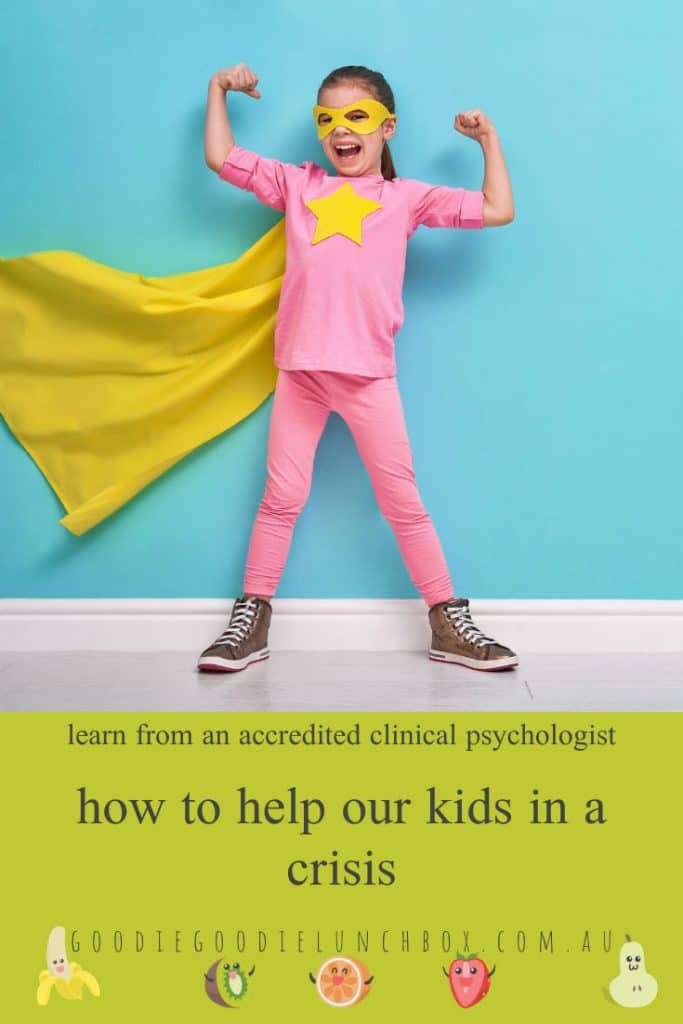Many parents, myself included, have found ourselves wondering how we can support our children and their mental health at this crazy time. So, who better to help us understand how we can help our kids in a crisis than accredited clinical psychologist Emily Hanlon of The Playful Psychologist! Emily has taken some time to provide helpful, simple and expert advice about how we can help our kids in a crisis. In this interview, we cover topics such as how to create a safe space at home, how can support our children when it’s time to go back to school. We also chat through resilience and how we can help support and develop this with our children at home, and much more! So grab a coffee and settle in for a great read!
Firstly, thanks so much for speaking with me Emily! Can you tell us a little about yourself and what attracted you to the field of psychology and your clinical interests?
I am a registered clinical psychologist and have a Bachelor of Arts (Psychology), Post Graduate Diploma of Psychology and a Masters of Clinical Psychology. I have a specific interest in developmental psychology, especially Autism Spectrum Disorder (ASD), Attention Deficit/Hyperactive Disorder (ADHD) developmental delay, anxiety, and building self-esteem.
My interest in childhood mental health began at a young age when my brother was diagnosed with Autism. This sparked my passion for supporting the needs of not only the child, but the siblings and family members of those who have a child in the family with additional needs.
I started my Instagram page and website as a way to share resources that can help support parents and children that may be struggling with mental health/developmental concerns.

It has certainly been a challenging few months! What has been your advice to parents during this time to help keep our homes a safe place for our children?
I think that during these crazy times, it is so important to remember that you aren’t a teacher. It is OK if you don’t get all the work done. I’m not saying that academics can completely be thrown out the window, they are definitely important, but not as important as your child’s mental health and emotional well-being.
As an adult, think about how stressed you are right now coping with all the changes that are taking place, now imagine how a young child may feel! They’re so used to the routine and structure of school where everything is set out for them and are so used to their daily schedules, and all of a sudden everything has changed. This can result in really big worries and even anxiety, so it is really important to remember that your child isn’t going to remember whether they completed all 30 math questions during quarantine, they’re going to remember whether their parents were in tune with their emotional needs and were there for them emotionally
So, in this regard, my number one piece of advice would be, focus your energy in important areas! And for me, the most important areas are developing self-esteem and resilience. Resilience is so important during lockdown! You may notice that your child has increased attention seeking or negative behaviour during this time. You need to figure out the WHY behind the behaviour. My motto is, you never have to agree with the behaviour a child displays, but you ALWAYS have to empathise with the emotion. So if we are talking about the current pandemic in particular, here are a couple of steps you can follow to help figure out what exactly your child is thinking about or worrying about.
Firstly, figure out what they are hearing about COVID-19. Are they watching the news or hearing you speak about it?
Secondly, figure out how you want to approach this topic with them. With my clients, I was being very mindful not to instill a sense of fear in kids. So instead of ‘make sure you wash your hands for 20 seconds because it you don’t you could get corona virus’ I was saying ‘the world is a little sick at the moment and we have to make sure we help the world feel better. Some things we can do to help the world feel better are to wash our hands, sneeze into our elbows, and stay home.’ Can you see how the language used shows that we are in control, not this ‘scary virus?’
Thirdly, validate their feelings. It is so important to never (accidently) dismiss their feelings. As parents/caregivers, it is your instinct to try and take worry away from your child, but this isn’t always helpful as it doesn’t give them an opportunity to work through the feeling. What I mean by this is, if your child says something like ‘I am worried that I will get the virus and have to go to hospital and be all alone.’ Don’t say something like ‘don’t worry, that would never happen!’ This makes them feel like their feelings are not valid or reasonable and that they are over reacting. Instead, say something like ‘It sounds like you’re really worried about corona virus and getting sick. I am really sorry you feel that way. It is a really scary time, isn’t it!’ By relaying their words back to them, you are showing them that you are actively listening to what they are saying and you are keeping the conversation open for them to continue expressing their feelings. By the end of the conversation, they may have even come up with a resolution to their problem/worry without your input.
How can we support our children when they are frustrated or upset as they cannot visit Grandparents or cannot play in the playground?
I think this comes down to what I mentioned above: empathising and validating their feelings about the situation rather than accidently dismissing them. This is actually something called Emotion Coaching. Emotion Coaching is a communication strategy which supports young people to self-regulate and manage their stress responses. A lot of research has found that children who thrive in their emotional and social development tend to have parents who respond positively to the behaviour and emotions of the children. A really great book to read is ‘Raising an Emotionally Intelligent Child’ by John Gottman. It’s a great place to start if you are wanting more information on how to support the emotional development and resilience of your child.
I know I have had a few conversations with parents who are concerned that there may be long term impacts on our children from a mental health point of view with respect to the recent pandemic. How can we help our kids?
Firstly, parents are all doing an amazing job during this ordeal. These are unprecedented times and there is literally no handbook on how to manage this situation! I also think that parents need to be aware that there is a huge difference between ‘home schooling’ and ‘online learning.’ Home schooling refers to educating a child at home in place of sending them to school. With home schooling, there is someone at home (typically a parent or a hired teacher) who is responsible for the education of the child.
On the other hand, online learning is education that takes place over the internet. In this instance, the role of the parent/caregiver is not to educate the child, but to support the child through their online education.
I think the media has put a lot of strain on parents to be these perfect teachers, and that is not only impossible (teachers have their education and a degree for a reason), but it is also really debilitating to the mental health of both parents and children.
In order to help your kids, I do think it is important to have a structure. It doesn’t need to be a really rigid one, but something that gives them a sense of understanding about what is expected of them throughout the day. Spending 10-15 minutes creating a structure for yourself and the kids, can save you hours in the long run.
If you think about a typical day at school, kids are told when to eat, when to work, when to play, and when to pack away. So, don’t be afraid to set a schedule for your kids. It will actually make them feel like they have much more control in the situation than they actually do. For example, there are specific food breaks. Do the same at home! Pack a lunch box and keep the exact same break times at school. This way, your child doesn’t need to ask you for lunch, they can grab their lunchbox from the fridge and go outside. Set a timer so they know when their break is finished, just like school. This may also help you get a little more work done!
Also, I may sound like a broken record at this point, but just make sure you are there to support your child’s emotions throughout these times. If you have multiple children, this may be really challenging.
One thing I suggest to parents of older children is for each child to have their own communication book. Encourage them to decorate an old notebook. If they want to talk to you about something, but you are working or busy with housework/another sibling, choose a special place in the house the child can leave the book. When you are free next, you can read what they have written and either respond by writing back or finding your child and having a conversation about what they have written in their journal. This way, you aren’t missing an opportunity to have these conversations with children, you are just waiting until you have the time and energy to respond thoughtfully.
From your point of view, how can we assist our children with going back to school when the time comes? I think my son Mr 8 has loved being at home so much he is going to really struggle with going back to school.
This question sure has come up a lot!! I think it is really important not to bring it up until you have solid details, as there is so much confusion going on already, that we don’t want to add to it! Once you know the details, it is important to bring it up as a super exciting thing and start the conversations early. This will give your child some time to process the information.
Again, discuss the positives, empathise with the worries. But, figure out what it is that they are worried about exactly. Are the worried about separating from you, are they worried about a bully at school, or have they just gotten too comfortable being at home? Each of these worries are totally different and therefore, our approaches would be totally different! So make sure you have all the information before you try to help them resolve the problem(s).
I know many of us are balancing home, work and remote schooling and there aren’t enough hours in the day. How can we look after our own mental health when we are stretched so thin?
First things first, you are NOT ALONE!! It is so hard to keep up with everything at the moment, especially because we can’t really leave the house! I think it is really important for parents to look after their own mental health, especially when being pulled in so many different directions!!
One way you can do this is by turning your mundane, daily routines into small rituals for yourself. For example, if you usually have your morning coffee in front of the TV or while making the kids breakfast, take 5 minutes to sit outside and have your coffee alone. Or if you’re going to take a shower, burn a candle and pop a face mask on and increase the time of your shower by just 5 or 10 minutes to give you some time alone. Self-care looks different for everyone, but it is still important. So, make a list of those short daily routines you have to do, and figure out a way to change them into experiences you look forward to. You need space, or you will lose your mind!!
You know how the saying goes; you can’t pour from an empty cup!!
What are your top tips to develop resilience in our kids?
Resilience is a really big topic and a super interesting one! Resilience is identified as the ability of an individual to bounce back from a difficult situation. Some kids develop it naturally and others need a little assistance from adults around them, and that’s ok!
Kids who are resilient are able to cope with stress very well, they are problem solvers, they aren’t afraid to ask for help when they need it, they are really goal driven, display empathy, can act independently, and are often described as responsible.
Resilience is heavily impacted by environmental factors, which is a good thing, because it means there are things we can do at home to support the development of resilience in children:
- Build strong emotional connections with kids, by having 1:1 time with kids which can be difficult if you have multiple kids! But this is where the journal I mentioned above may come in handy!
- Promote healthy risk taking i.e., trying a new sport or food. Kids that avoid all risk internalize the message that they aren’t strong enough to get through challenges. So, by encouraging small risks, you are showing them that they CAN get through challenging times!
- Help them develop problem solving abilities by responding to their questions with more questions, rather than giving them the answer. For example, ‘that is a really great question, what do you think XX should do in that situation?’ This gives them the opportunity to come up with possible solutions and they’ll see they are capable of problem solving themselves.
- Label and discuss emotions as a family. Acknowledge and identify the feelings, not only in the children, but in yourself as well. So, if you are feeling angry, let the kids know! ‘Mum is feeling really angry right now because XXX.’ Also make sure you are helping your child label and identify emotions in themselves. The more in tune children are with their emotions, the more they are able to problem solve on the back of this knowledge.
- Demonstrate coping skills to your kids by modelling. For example, if you are wanting children to try taking deep breaths, you need to show your child that you are also doing these when you are upset or frustrated.
- Embrace mistakes! It may seem obvious, but it is important to embrace mistakes because if you avoid failure, you never learn to manage the feelings associated with failure and how to bounce back from those situations.
- Look at the bright side! Sometimes kids can find it tricky to think of the glass half full, so it is again important to model this for children. You can still acknowledge the negative thoughts and feelings, but help your child look at the bright side. My CBT Journal is perfect for kids trying to work through challenging thoughts and feelings!
- Set and achieve small achievable goals and helping your children try to achieve them. This is particularly important during isolation! Goals could be anything, as long as they have something they are motivated to strive towards!
How do I know if my child is struggling with mental health and how can I best support my child?
The most important thing to do if you are concerned with your child’s mental health, is to seek assistance from a professional.
During these times, psychologists are considered an essential service, so you are still able to see someone. You can also do a few sessions via telehealth if you are not comfortable going into a clinic just yet. If there is nothing seriously wrong, then seeing a professional will at least put your mind at ease. However, if an issue is detected, then you have sought early intervention for your child, and you have placed your child in the best possible position for success.
What are your silver linings from the recent pandemic?
I think we have come to appreciate our freedom a lot more and we won’t take it for granted as much!!
We have also come to appreciate our family more, and I know for me especially, I will never take seeing my family every day for granted ever again!! I also really love reading stories about how the earth has become cleaner thanks to pollution, and I LOVE seeing how clear the water is when I go for my daily walks!!
Thank you! Now for a little more about you, do you ever pack a lunchbox for yourself and what do you love to pack?
I usually pack a lunch box every day when I go to work. I am a BIG grazer, so I typically pack lots of snacks like some crackers, dip, fruit, veggie sticks and something sweet. I also find if I eat hot food I am more full (as opposed to a cold meal like a salad), so my lunches are usually roasted veggies, protein, left over pasta, or a toastie.
And just for a bit of fun…what are you:
Reading: The Women’s Murder Club Series by James Patterson, I love murder mysteries!!
Listening to: Old School RnB
Drinking: Lot’s of sparkling water (thank you pregnancy)
Eating: ALL the carbs (again, THANK YOU pregnancy)
Dreaming of: going on my next holiday and enjoying some family time on the beach
What are your special skills and if you could have a super power what would it be?
I actually have a really good memory. Not a photographic memory, so it didn’t help much while I was at school, but I remember SO many things about my childhood and how I grew up and I think that’s really special because I will always have those memories with me!
If I could have any superpower, it would be the power of ‘speed’ so I could get the boring things done, like cleaning, really quickly, and then have more time for all the important and fun things in life!
Thank you so much for joining me on the blog Emily! And readers, please go and visit @theplayfulpsychologist on Instagram and be sure to check out her website for more information. If you enjoyed this blog post you may also love these interviews:
- What you need to know to prepare your child for school
- How to pack a tooth friendly lunchbox
- What you need to know about packing lunchboxes with picky eaters
I hope you are all keeping safe and well at this time.
Bernadette x





